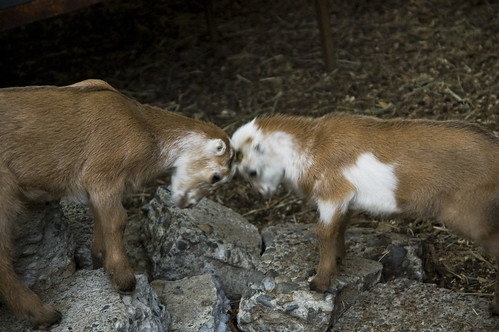
In searching for the final piece of the series on Urban Agriculture, I wanted to discover something profoundly un-urban and out of the ordinary. After visiting the bee hives featured in a previous article, I was directed up the street to a secluded home on 34th ave and promised a view of urban agriculture at its finest. I was not let down, and was introduced to the first legally born goats in Seattle in decades.
The backyard of DeeDee Burpee and Tom Beirley’s home was teeming with life. Gardens, bees, trees, chickens, and goats each contributed to an ecosystem that Burpee now considers their own home farm. It started four and a half years ago, when the family acquired hens for eggs and company. While they have always been gardening, the bees and goats are new as of last year. The goats are lively, friendly but a big commitment. “We go out and gather food for them every few days, and after the pregnancy, milk the mother every morning at 5:30 AM,” said Beirley. But they are still part of the family says Burpee, adding that they make good company on hikes and even around the backyard.
The family’s friend, Jenny Grant, a local goat activist and head of the Goat Justice League, was the original provider of the family’s goats. Grant was the driving force behind the legislation to bring goats back into residential areas after they were banned during the urbanization era of the Seattle area.
The new code limits goat ownership to certain miniature goat breeds, and requires males to be dehorned and neutered. “The rules are fine,” said Beirley. “You really don’t want a unneutered male in your back yard. They smell terrible.”
Burpee and Beirley estimated it would cost only about $200 to $300 to adjust an average backyard for goats, but warns people of the level of responsibility involved with owning goats. If you are up for the challenge, the three three-week-old kids are looking for a good home, and someone experienced enough to take care of them.

